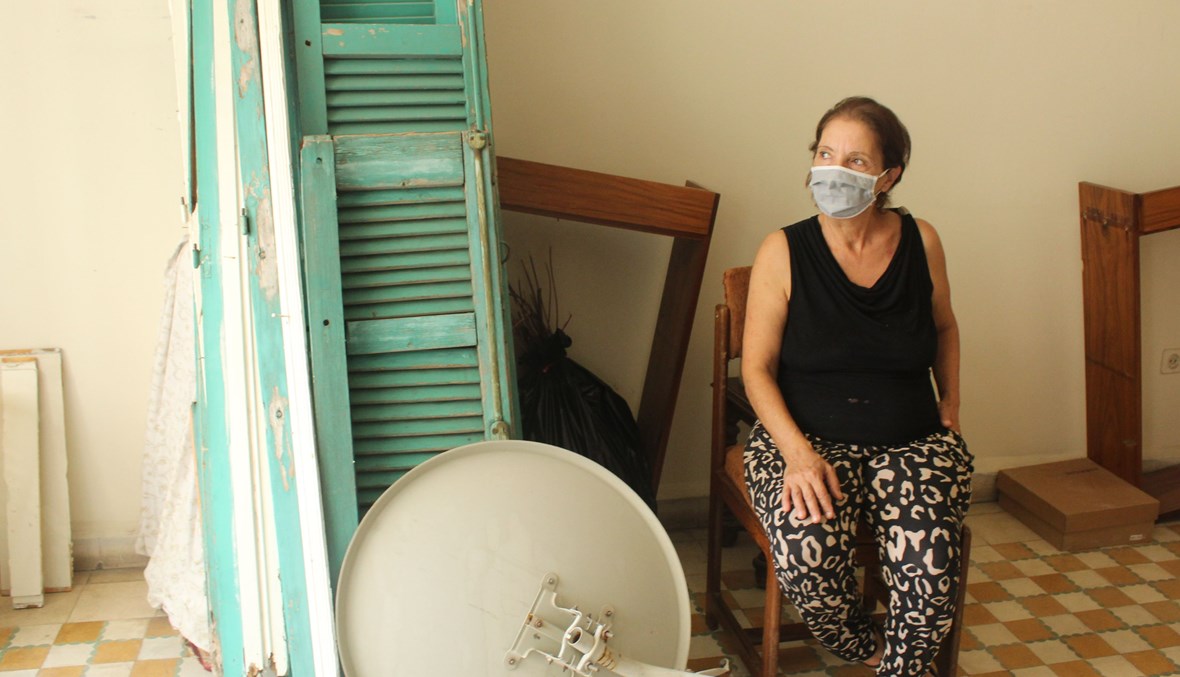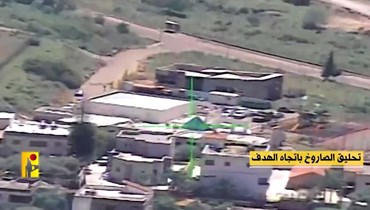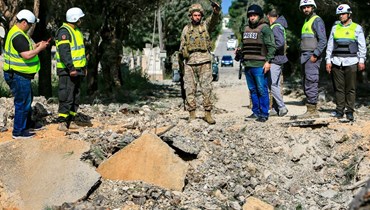The Beirut blast’s ongoing challenges for the elderly
29-09-2020 | 12:54
Source: Annahar
By Nada Richa
BEIRUT: Older people are facing significant challenges to recover from the tragic Beirut explosion. At a time when COVID-19 is on the rise, thousands of older people have been left without food and shelter, making this critical phase much harder on them.
Throughout the past three decades, the proportion of individuals above 65 years old in Lebanon has risen to 7.3 percent. With the absence of a universal social security system and a uniform retirement plan, poverty is prevalent among older people, especially among older women, who are less likely to have worked throughout their lives, and are thus less likely to have savings and access to social protection tools.
In a country that prioritizes the duties of younger generations toward their elders, older people with no family to support them are at higher risk of poor health, isolation, and poverty.
Since the deadly explosion occurred, older people are considerably affected by the blast at different levels. The explosion ruined the traditional districts of central Beirut where a high number of older people live, many of whom were already living in extreme poverty.
In this respect, an initial report undertaken by ACTED, an international humanitarian NGO, reveals that the elderly, women, and people with specific needs are the ones most in need of assistance across impacted areas.
Economically, poverty among older people has risen following the explosion. Further, access to medical care has become harder for them as the healthcare system in Lebanon is already facing notable challenges because of the Covid-19 pandemic- a situation aggravated by the blast.
Psychologically, the explosion’s accompanying trauma has been devastating particularly to the vulnerable older people. In this respect, many traumatized elderly residents refused to leave their damaged houses after the blast and preferred to sleep in poor housing conditions or on the streets.
A recent survey conducted by the international NGO Help Age along with its partners Makassad and Amel found that 26% of the respondents felt that their mental health was a major health concern following the Beirut blast, especially for older people (25%). The study focused on neighborhoods with pre-existing vulnerabilities, located near the explosion site.
Following the Beirut blast, numerous humanitarian actors are responding to older people’s needs.
In this regard, the UN and its partners are designing emergency cash assistance initiatives targeting the most vulnerable and in need, including the elderly. Besides, many organizations and NGOs are supporting older people by providing them with food and medication.
Furthermore, some NGOs are helping older people reconstruct their houses and fix the damage caused by the blast. In this respect, Live Love Lebanon, the NGO behind the “RebuildBeirut” relief initiative and Bassma NGO, revealed that half of the total houses they have fixed so far belong to older people.
Disaster Recovery testimonials
Older people in Lebanon have endured a lot throughout their lifetimes. They have experienced many wars, conflicts, and political instabilities, which reflects a distinctive aspect of aging in this country. The stressful situations they have undergone have strongly affected their mental health and psychosocial wellbeing.
“I can still hear the blast’ noise in my ears and fear still overwhelms my heart,” Souheila, a 73-year-old widow, told Annahar.
Souheila has lived alone in her house in Mar Mikhael for the past 20 years. More than a month after the blast, she hardly believes she is still alive and conscious. However, she still gets frightened whenever she hears loud noises in her neighborhood. Souheila thanks God for her children who are supporting her emotionally, besides having fixed a big part of her damaged house. Yet, she is waiting for NGO support to help repair her house’s remaining damage.
Nohad, 67, has lived for 38 years at her house in Mar Mikhael. As a result of the horrendous explosion, her house was significantly damaged. “I lost almost everything in a minute. Financially, I used to live one day at a time. Now, I cannot even afford my daily needs,” Nohad told Annahar.
BEIRUT: Older people are facing significant challenges to recover from the tragic Beirut explosion. At a time when COVID-19 is on the rise, thousands of older people have been left without food and shelter, making this critical phase much harder on them.
Throughout the past three decades, the proportion of individuals above 65 years old in Lebanon has risen to 7.3 percent. With the absence of a universal social security system and a uniform retirement plan, poverty is prevalent among older people, especially among older women, who are less likely to have worked throughout their lives, and are thus less likely to have savings and access to social protection tools.
In a country that prioritizes the duties of younger generations toward their elders, older people with no family to support them are at higher risk of poor health, isolation, and poverty.
Since the deadly explosion occurred, older people are considerably affected by the blast at different levels. The explosion ruined the traditional districts of central Beirut where a high number of older people live, many of whom were already living in extreme poverty.
In this respect, an initial report undertaken by ACTED, an international humanitarian NGO, reveals that the elderly, women, and people with specific needs are the ones most in need of assistance across impacted areas.
Economically, poverty among older people has risen following the explosion. Further, access to medical care has become harder for them as the healthcare system in Lebanon is already facing notable challenges because of the Covid-19 pandemic- a situation aggravated by the blast.
Psychologically, the explosion’s accompanying trauma has been devastating particularly to the vulnerable older people. In this respect, many traumatized elderly residents refused to leave their damaged houses after the blast and preferred to sleep in poor housing conditions or on the streets.
A recent survey conducted by the international NGO Help Age along with its partners Makassad and Amel found that 26% of the respondents felt that their mental health was a major health concern following the Beirut blast, especially for older people (25%). The study focused on neighborhoods with pre-existing vulnerabilities, located near the explosion site.
Following the Beirut blast, numerous humanitarian actors are responding to older people’s needs.
In this regard, the UN and its partners are designing emergency cash assistance initiatives targeting the most vulnerable and in need, including the elderly. Besides, many organizations and NGOs are supporting older people by providing them with food and medication.
Furthermore, some NGOs are helping older people reconstruct their houses and fix the damage caused by the blast. In this respect, Live Love Lebanon, the NGO behind the “RebuildBeirut” relief initiative and Bassma NGO, revealed that half of the total houses they have fixed so far belong to older people.
Disaster Recovery testimonials
Older people in Lebanon have endured a lot throughout their lifetimes. They have experienced many wars, conflicts, and political instabilities, which reflects a distinctive aspect of aging in this country. The stressful situations they have undergone have strongly affected their mental health and psychosocial wellbeing.
“I can still hear the blast’ noise in my ears and fear still overwhelms my heart,” Souheila, a 73-year-old widow, told Annahar.
Souheila has lived alone in her house in Mar Mikhael for the past 20 years. More than a month after the blast, she hardly believes she is still alive and conscious. However, she still gets frightened whenever she hears loud noises in her neighborhood. Souheila thanks God for her children who are supporting her emotionally, besides having fixed a big part of her damaged house. Yet, she is waiting for NGO support to help repair her house’s remaining damage.
Nohad, 67, has lived for 38 years at her house in Mar Mikhael. As a result of the horrendous explosion, her house was significantly damaged. “I lost almost everything in a minute. Financially, I used to live one day at a time. Now, I cannot even afford my daily needs,” Nohad told Annahar.
Despite the support of different NGOs, to whom she is extremely thankful, Nohad sates that her house still needs a lot of work. The explosion left her emotionally and physically drained, while her medications have not been available recently in the Lebanese pharmacies.
Ultimately, the blast affected everyone in Lebanon. While the government’s support is non- existent, the humanitarian actors are playing a massive role in helping the victims. Yet, many people, including the elderly, are still beyond reach. Amid this life-altering disaster, it is crucial and challenging to ensure that the collective response to the disaster provides long- term solutions and supports all the victims, including the vulnerable groups like older people.
Ultimately, the blast affected everyone in Lebanon. While the government’s support is non- existent, the humanitarian actors are playing a massive role in helping the victims. Yet, many people, including the elderly, are still beyond reach. Amid this life-altering disaster, it is crucial and challenging to ensure that the collective response to the disaster provides long- term solutions and supports all the victims, including the vulnerable groups like older people.


 اشترِك في نشرتنا الإخبارية
اشترِك في نشرتنا الإخبارية











